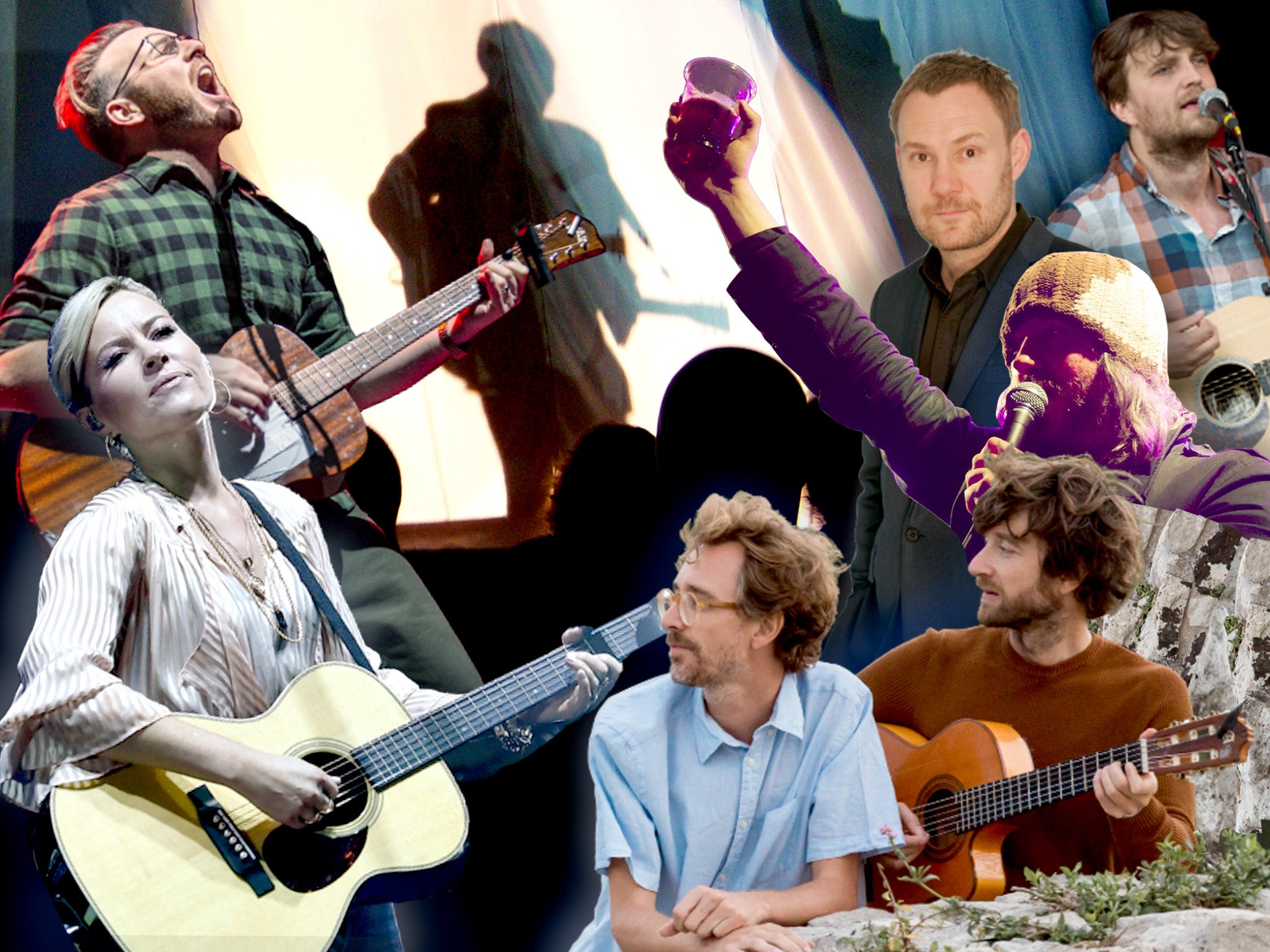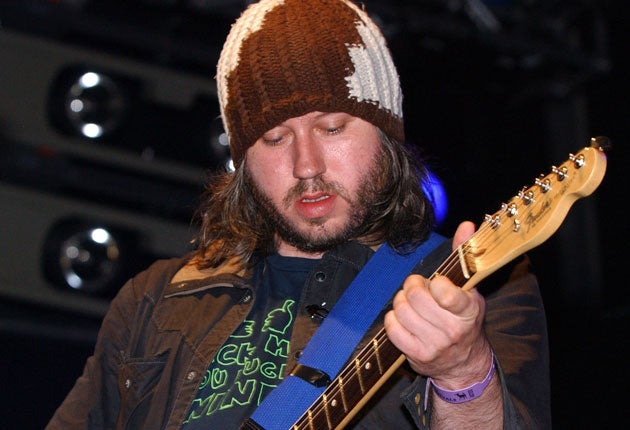It’s oh so quiet: does 2000s acoustic indie deserve another chance?
From Badly Drawn Boy and David Gray to Travis and Turin Brakes, the turn of the century was swamped by earnest troubadours singing sad songs. It’s often seen as a nadir for guitar music but, asks Sean Griffiths, is the period really as dull as it’s remembered?

Your support helps us to tell the story
From reproductive rights to climate change to Big Tech, The Independent is on the ground when the story is developing. Whether it's investigating the financials of Elon Musk's pro-Trump PAC or producing our latest documentary, 'The A Word', which shines a light on the American women fighting for reproductive rights, we know how important it is to parse out the facts from the messaging.
At such a critical moment in US history, we need reporters on the ground. Your donation allows us to keep sending journalists to speak to both sides of the story.
The Independent is trusted by Americans across the entire political spectrum. And unlike many other quality news outlets, we choose not to lock Americans out of our reporting and analysis with paywalls. We believe quality journalism should be available to everyone, paid for by those who can afford it.
Your support makes all the difference.What were you up to in the year 2000? Maybe you were tuned in to the first series of Big Brother, texting your mates on your Nokia 3310 to discuss how outraged you were at Nasty Nick’s dastardly deeds. Perhaps you were reeling from another agonisingly early England exit from the Euros. Or laughing about the Millennium Bug being one big conspiracy that didn’t, in fact, bring down the world’s technological infrastructure.
But maybe, just maybe, you were getting over a tough break-up. And if you were, it’s likely you might have turned to the popular music of a short period between 1998 and 2003, made by a bunch of softly spoken blokes with acoustic guitars strapped across their chests. Some of them had beards, some of them wore tea cosies on top of their heads, but all made music that can be broadly described as delicate, melancholic and introspective.
This time in guitar music provided a gentle lull between the frivolity of Britpop and the adrenaline rush of scenes like the new rock revolution and new rave in the late Nineties and early 2000s. But it is all but forgotten when talking about British music history. It was dubbed the “New Acoustic Movement” by that great lover of genre labelling, the NME, and was largely critically written off.
Alan McGee referred to one of the period’s biggest breakthrough bands, Coldplay, as “music for bedwetters”, while bands like Travis were, despite headlining Glastonbury, hardly viewed as cool – sentiments that were reflected in the title of a recent documentary about the band, Almost Fashionable. Meanwhile, David Gray’s 1998 album of bedroom songs, White Ladder, was omnipresent and became the butt of journalists’ snide jokes about romance and meaningful TV montages. Pitchfork archly called it “a phenomenon that defies explanation” in a review of White Ladder’s reissue last year – it has still spent more time on the UK charts than any other album. And then there was, of course, Dido.
But perhaps this phenomenon of quiet music shooting to the top of the charts can be explained after all. A brand new book by music journalist Tom Clayton, When Quiet Was The New Loud: Celebrating the Acoustic Airwaves 1998-2003, is out this week and attempts to re-examine it all, asking whether this period that created some of the biggest British bands – from Coldplay to Elbow – has been unfairly overlooked, even cruelly dismissed.
“I was in my early teens at the time,” Clayton tells The Independent. “I was just finding my place in the world and was spooked by how big everything was. A lot of those records were a great comfort to me and showed that sensitive young lads could make really lovely records and be successful.”
Clayton focuses on albums from the period including Badly Drawn Boy’s The Hour of the Bewilderbeast, which went on to beat both Coldplay and Primal Scream to the 2000 Mercury Music Prize (as well as other names that broadly fitted into the new acoustic movement, such as Doves, The Delgados and Kathryn Williams). Other bands he dedicates a chapter each to include Electric Soft Parade, Turin Brakes and Mull Historical Society, while the title takes its name from Norwegian duo Kings of Convenience’s 2001 album.
Clayton says it’s unsurprising that the music-loving public was looking for stuff to soothe. “A lot of the music came between Princess Diana’s death and 9/11,” he says, pointing to names like Sparklehorse and Alfie as other favourites from the time. “It felt like a period when we were deflated and in retreat a little, and looking for comfort.”
Looking back, the movement could be said to be largely split into two transatlantic camps: on the one hand you had a lot of bands taking their cues from “Noel’s acoustic numbers with Oasis and Bends-era Radiohead,” says the music journalist and Independent writer Mark Beaumont. And on the other, there was the quietly innovative electronic folk of American acts like Grandaddy and the restrained experimentalism of acts like Yo La Tengo and Lambchop.
Enjoy unlimited access to 100 million ad-free songs and podcasts with Amazon Music
Sign up now for a 4 month free trial (3 months for non-Prime members)
Enjoy unlimited access to 100 million ad-free songs and podcasts with Amazon Music
Sign up now for a 4 month free trial (3 months for non-Prime members)
“This alt folk/country scene drifted over from the US, where people had got really into Elliot Smith,” says Beaumont. “That included acts like Grandaddy and early Doves and Elbow – music that wasn’t strictly acoustic but had some psychedelic elements and real atmospheric greatness to it and was gentle and melancholic, too.”
It’s something Damon Gough, who got routinely handed the acoustic troubadour tag in his beanie hat-wearing Badly Drawn Boy guise, backs up: “I liked troubadour as it was Dylan-esque but lo-fi was a more accurate description of my music than acoustic. I was a bedroom artist really, inspired by all these acts coming over from America like Beck, Ween and The Flaming Lips. I absolutely loved bands like Grandaddy and Tindersticks around at that time, too.”

“It felt like something was happening that was new and exciting even if it wasn’t pulling the roof off anything,” Clayton adds. “There was a dedication to craft and a certain type of songwriting that felt classic as it was unfolding. A lot of it harked back to people like [folk musician] Tim Buckley and that classic Laurel Canyon sound.”
The new acoustic movement also neatly dovetailed with what was going on in electronic music: the chillout compilation was de rigueur and albums like Moby’s Play and Air’s Moon Safari were ubiquitous. Likewise, some of the so-called “acoustic” albums were a little more innovative and experimental than they’ve been given credit for when it came to production. David Gray made White Ladder, for example, in his bedroom with a drum machine (recommended to him by Orbital’s Phil Hartnoll no less – whose remix of “Please Forgive Me” turned it into an unlikely dancefloor hit) and there were touches of drum’n’bass and even some pre-dubstep wobble lingering underneath his crooning.
One of the greatest bands from that period, Kings of Convenience, who are back this week with their first album in 12 years, also echo how they had a similarly homespun, DIY approach to music-making. They say that their sound was a result of circumstance rather than intent and they had more in common with “people making underground electronic music in Bergen”.
“We really wanted to make house music, but we couldn’t afford all the fancy equipment,” the band’s Erik Glambek Bøe tells The Independent, “so we had to work from the sofa in my mum’s living room with the only tools we had: two guitars.”
Despite their instruments, they say they “never felt a part of a scene of acoustic music at that time, we always felt the tag was a bit random”, and that they identified with Badly Drawn Boy but also Norwegian dance duo Royksopp and French indie-pop group Phoenix. The title of their 2001 album Quiet is the New Loud, was actually quite subversive – a knowing wink at the genre labels such as “the new acoustic movement” that were being bandied around during that era. It “proved that we were aware of the fact that what we were doing was different,” says Bøe, “and because those kinds of slogans were used a lot around that time.”

Clayton agrees, writing of Quiet is the New Loud that it has “close harmonies, gently rueful lyrics, musicianship that blends warmth and exactitude in a way few have managed before or since ... Despite the assurances of its title, and the modesty of its creators, this was the loudest of statements.”
It’s easy to draw a line from this period to contemporary singer-songwriters like Ed Sheeran and Lewis Capaldi as evidence of the movement’s everyman legacy but artists like James Blake or Bon Iver are just as much its natural heirs. Blake too understands the criticism levelled at his forebears. As he pointed out in 2018 when he tackled the “sad boy” tag used to describe his music, it “contributed to the ever disastrous historical stigmatisation of men expressing themselves emotionally”. Men who openly discuss their innermost feelings in their music are often derided and ridiculed the most.
The values of the new acoustic movement chime with today, too. In his book, Clayton writes that these were “a set of artists who valued kindness, vulnerability and community – and delivered those principles in the form of varied, ambitious and frequently extraordinary music. And while taken together they only form the slipperiest of musical ‘movements’, they are bound together through what they stood for. We should cherish them.”
Ultimately, the so-called new acoustic movement wasn’t to last. The arrival of garage rock bands like The Strokes and The White Stripes on these shores in 2001 made the new acoustic acts sound instantly redundant. “It suffered from being sandwiched between two much louder movements in guitar music that had so much swagger and brash confidence,” says Clayton. “I remember NME writing ‘last one to the tattoo parlour still likes Turin Brakes’ when they reviewed the first Black Rebel Motorcycle Club album. Some of those records took an absolute kicking from the press and were sidelined very quickly.”
And while openly flying the flag for acts like Elbow, Badly Drawn Boy, Grandaddy, Sparklehorse and early Coldplay, Beaumont still takes some convincing to view the period as an underappreciated and forgotten-about golden era. “I see it as a warning,” he says. “You could be in a period of music where something really bright and exciting is happening but you might only be a few years away from someone turning round to you and saying, ‘Are you a big Starsailor fan?’”
‘When Quiet Was The New Loud: Celebrating the Acoustic Airwaves 1998-2003’ is out now; Kings of Convenience’s ‘Peace Or Love’ is out on 18 June



Join our commenting forum
Join thought-provoking conversations, follow other Independent readers and see their replies
Comments